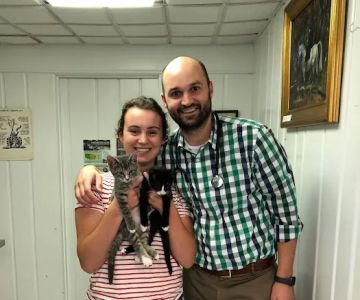What is a Critical Care Veterinarian?
As a pet owner, you may have heard the term "critical care veterinarian" but might not fully understand what it entails. In this article, I'll walk you through what critical care veterinarians do, the importance of their role in animal health, and why they are vital when your pet faces serious medical emergencies. Having a trusted critical care veterinarian can mean the difference between life and death for your beloved pet, so let's dive deeper into their critical role.
The Role of Critical Care Veterinarians
Critical care veterinarians are specialized professionals in veterinary medicine who focus on treating animals that are critically ill or injured. Much like doctors who specialize in intensive care units for humans, critical care veterinarians are equipped to handle medical emergencies and provide life-saving treatments to pets.
These veterinarians typically work in animal hospitals or specialized veterinary clinics and are trained to stabilize and manage severe cases, such as accidents, sudden illnesses, or postoperative complications. Their expertise lies in intensive care, monitoring, and making quick decisions that directly affect the survival and recovery of the animal.
Common Conditions Treated by Critical Care Veterinarians
Critical care veterinarians are called upon to manage a variety of conditions that require urgent medical attention. Some of the most common situations they handle include:
- Trauma: Pets involved in car accidents or falls may suffer from severe internal injuries, broken bones, or head trauma.
- Sepsis: This life-threatening condition arises when an infection spreads throughout the body, causing inflammation and organ failure.
- Cardiopulmonary failure: Pets with heart or lung failure need immediate care, often requiring ventilation or oxygen therapy.
- Poisoning: Animals who ingest toxic substances, like certain plants or chemicals, may need critical intervention.
- Emergency surgery: Critical care veterinarians may perform emergency surgeries to treat internal bleeding, obstructions, or other urgent conditions.
How Critical Care Veterinarians Differ from Regular Veterinarians
While regular veterinarians provide essential health care and preventive treatments, critical care veterinarians are equipped to manage severe, life-threatening conditions. They are specially trained in intensive care, advanced diagnostic techniques, and emergency response. Critical care veterinarians also have the skills to operate life-saving equipment, monitor vital signs in real-time, and make split-second decisions that can significantly impact a pet's recovery.
In many cases, a critical care veterinarian may work alongside other veterinary specialists, such as cardiologists, neurologists, or surgeons, to provide comprehensive care tailored to the pet's specific needs.
The Importance of Choosing a Reliable Animal Hospital for Critical Care
When your pet requires critical care, it's essential to choose a veterinary hospital that has a dedicated critical care unit staffed with highly skilled professionals. Having access to 24/7 emergency care can save precious time when every minute counts. Some animal hospitals also offer telemedicine services, allowing you to consult with a critical care veterinarian remotely, which can be especially helpful in emergencies.
If you're looking for a trusted facility with experienced critical care veterinarians, it's important to do your research. Look for hospitals that are accredited by recognized veterinary organizations, have well-trained staff, and provide advanced diagnostic and treatment options.
Real-life Example: How Critical Care Veterinarians Save Lives
Let me share a real-life story that highlights the life-saving work of a critical care veterinarian. A friend of mine, Sarah, had a dog named Max, who was involved in a severe accident. Max was hit by a car and suffered multiple fractures, internal bleeding, and a head injury. Sarah rushed Max to the nearest animal hospital, where a critical care veterinarian immediately took charge of his care. The team stabilized Max, performed emergency surgery, and monitored him closely in the ICU for several days.
Max made a full recovery, thanks to the quick actions and expertise of the critical care veterinarian. This is just one example of how these specialists work tirelessly to save pets' lives in times of crisis. For Sarah, having a dedicated critical care veterinarian at her side was invaluable, and she was forever grateful for the care Max received.
Conclusion: The Vital Role of Critical Care Veterinarians
Critical care veterinarians play an indispensable role in animal healthcare, offering life-saving interventions in emergencies and complex medical cases. Their ability to quickly assess, diagnose, and treat severely ill or injured pets can make the difference between life and death. If you're ever faced with a situation where your pet needs urgent care, knowing that a critical care veterinarian is available can bring peace of mind.
By understanding the role of critical care veterinarians and the importance of choosing a reputable animal hospital, you can ensure your pet receives the best possible care when they need it most. Don't hesitate to seek out a trusted veterinary facility that specializes in emergency and critical care, and always be prepared for the unexpected.











